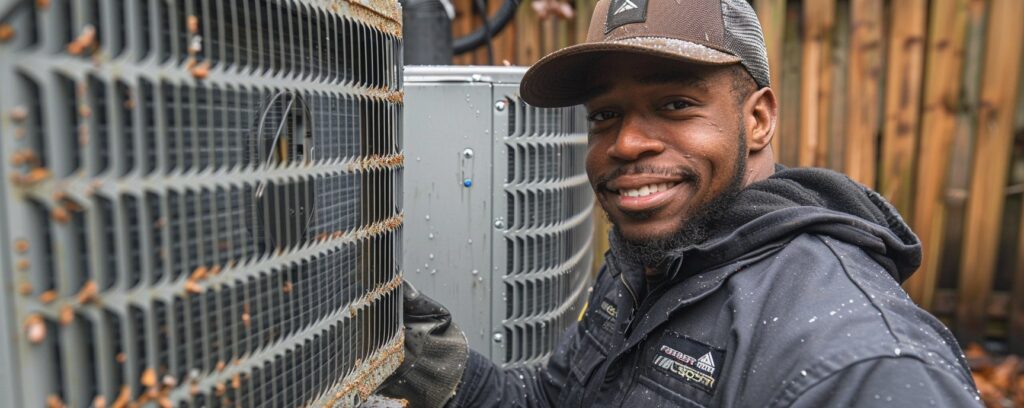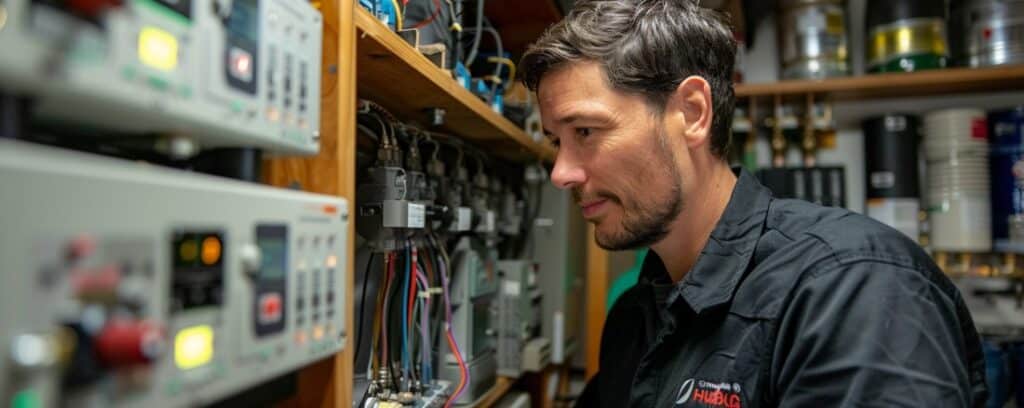In today’s technologically advanced world, the significance of heating, ventilation, and air conditioning (HVAC) systems cannot be overstated. These systems play a pivotal role in ensuring our homes, offices, and public spaces remain comfortable and healthy environments year-round.
At the heart of these systems is the HVAC technician, a skilled professional who installs, maintains, and repairs these critical systems. If you’ve ever found yourself intrigued by the complexity of these systems or possess a penchant for technical and hands-on work, a career as an HVAC technician might be right up your alley. This article provides a step-by-step guide on how to become an HVAC technician and explores the vast opportunities within this dynamic field.
Step-by-Step Guide: How to Become an HVAC Technician
Step 1: Understanding the Basic Requirements
Before diving into the world of HVAC, it’s essential to get acquainted with the basic prerequisites that potential technicians must meet. While specific requirements can vary depending on the region or employer, some general standards are almost universally recognized:
-
Minimum Age: Most apprenticeship programs and employers prefer candidates who are at least 18 years old.
-
Physical Fitness: The nature of HVAC work often requires lifting heavy equipment, crawling in tight spaces, and standing for extended periods. Thus, a certain level of physical fitness is crucial.
-
Educational Background: While a bachelor’s degree is not mandatory, having a high school diploma or a GED is typically a basic requirement. Courses in mathematics, physics, and technical drawing can be particularly beneficial as they provide a foundation for understanding HVAC systems.
-
Communication Skills: HVAC technicians frequently interact with clients, suppliers, and other professionals. Therefore, good communication skills are essential to explain complex technical concepts in simple terms and address any client concerns.
-
Mechanical Aptitude: A natural inclination towards understanding and working with machinery can be a significant advantage in this field.
In the upcoming steps, we’ll delve deeper into the educational and training pathways that can prepare you for a successful career in HVAC.
Step 2: Complete High School or Obtain a GED
The journey to becoming an HVAC technician begins with a strong educational foundation. While advanced degrees aren’t always necessary, possessing at least a high school diploma or its equivalent, such as a GED, is typically a fundamental requirement for most HVAC training programs and employers.
High School Courses of Relevance:
-
Mathematics: HVAC work often involves calculations, ranging from determining the correct size of a unit for a specific space to gauging energy efficiency. Courses in algebra and geometry can provide the necessary mathematical foundation.
-
Physics: Understanding how different materials conduct heat, the principles of thermodynamics, and the mechanics of different HVAC components is vital. Physics courses in high school can lay the groundwork for this understanding.
-
Technical Drawing: This subject can be invaluable for reading and interpreting blueprints or schematics, which are essential when installing or troubleshooting HVAC systems.
-
Shop Classes: Classes that offer hands-on experience with tools and machinery can give a preliminary feel for the kind of work HVAC technicians do.
Apart from these subjects, soft skills developed during high school, such as problem-solving, critical thinking, and team collaboration, can be immensely beneficial as you progress in the HVAC field.
Step 3: Consider Post-Secondary HVAC Technician Training
Once you’ve secured your high school diploma or GED, the next logical step is to explore post-secondary training opportunities. These programs are designed to equip you with specialized knowledge and practical skills, making you job-ready upon completion.
Types of Training Programs:
-
Diploma Programs: Typically lasting a year or less, these programs provide foundational knowledge about HVAC systems, tools, and installation techniques.
-
Certificate Programs: These short-term programs offer specialized training on specific HVAC topics. They can be useful for those looking to enhance a particular skill set or get a brief overview of the industry.
-
Associate Degree Programs: Lasting about two years, these programs offer a more comprehensive HVAC education, covering everything from the basics to more advanced topics. They often include general education courses and provide a broader understanding of the HVAC field.
Many community colleges, trade schools, and technical institutes offer these programs. When choosing a program, it’s essential to ensure it is accredited, as this ensures the curriculum meets industry standards and can pave the way for future certifications.
In addition to theoretical knowledge, many of these programs also offer hands-on lab experiences, simulating real-world HVAC challenges. This practical exposure is invaluable, allowing students to bridge the gap between theory and practice before they even step into the professional world.
Step 4: Hands-on Apprenticeship Experience
After completing formal education, nothing beats the real-world experience you gain from an apprenticeship. Apprenticeships provide the invaluable opportunity to learn directly from seasoned professionals, giving you an up-close view of the daily challenges and rewards of HVAC work.
Benefits of an Apprenticeship:
-
Practical Knowledge: You’ll handle real tasks, from installation and repair to maintenance and troubleshooting, under the guidance of experienced technicians.
-
Compensation: Unlike many internships, apprenticeships in the HVAC field are typically paid, allowing you to earn while you learn.
-
Networking: Being on the job means you’ll interact with other professionals in the industry, establishing connections that can be beneficial when seeking full-time employment.
How to Find and Apply for Apprenticeships:
-
Industry Associations: Organizations such as the Air Conditioning Contractors of America (ACCA) or the Plumbing-Heating-Cooling Contractors Association often have information on available apprenticeships.
-
Local Unions: They can offer apprenticeship programs that combine classroom instruction with on-the-job training.
-
HVAC Companies: Many established HVAC businesses offer apprenticeship programs to train potential future employees.
Step 5: Obtain Necessary Certifications
Certification is a way to showcase your expertise and commitment to the profession. While not always mandatory, many employers prefer or even require technicians to have certain certifications, ensuring that they meet industry standards.
Types of Certifications:
-
EPA Section 608 Certification: Mandated by the U.S. Environmental Protection Agency, this certification is crucial for technicians who work with refrigerants. There are different types based on the specific equipment you’ll be handling.
-
North American Technician Excellence (NATE): A nationally recognized certification, NATE covers various specializations within the HVAC field.
-
HVAC Excellence: This offers a range of certifications from employment-ready certifications for beginners to professional-level credentials for seasoned technicians.
How to Become a Certified HVAC Technician:
-
Choose the Right Certification: Depending on your interest and career goals, select the certification that aligns best with your aspirations.
-
Prepare for the Examination: Each certification has its examination, often based on a combination of theoretical knowledge and practical skills. Invest time in preparation, using study guides and sample tests.
-
Take and Pass the Exam: Upon passing, you’ll receive your certification, which can be a significant boost to your resume and career prospects.
Step 6: State Licensing (if applicable)
While certification showcases your expertise and qualifications, licensing is a legal requirement in many states to practice as an HVAC technician. Licensing procedures and requirements can vary significantly from one state to another, but they generally ensure that technicians adhere to local codes and standards.
Understanding the Importance of Licensing:
-
Legal Requirement: In many states, practicing without a license can lead to penalties, fines, or legal actions. Ensuring you have the necessary licenses can save you from potential legal complications.
-
Professional Credibility: Just like certifications, having a state license can enhance your credibility among employers and clients, showing that you’ve met the rigorous standards set by the state.
-
Ensures Safety: Licensing processes often ensure that technicians are knowledgeable about local safety regulations and standards, ensuring the well-being of both the technician and the client.
The Typical Licensing Process:
-
Determine State Requirements: Since licensing requirements can vary, start by checking with your state’s contractor licensing board or a similar agency.
-
Accumulate Required Experience: Some states might require you to have a certain amount of work experience, often ranging from 2-5 years, before applying for a license.
-
Pass a State Licensing Exam: Similar to certification exams, these tests evaluate your knowledge of HVAC systems, local codes, and safety regulations.
-
Submit an Application and Fees: Once you’ve met the prerequisites and passed the exam, you can formally apply for a license. This process often includes submitting an application form along with any necessary fees.
-
Stay Updated: Many states require licensed HVAC technicians to renew their licenses periodically. This might involve taking continuing education courses or paying a renewal fee.
Considerations for Licensing:
-
Reciprocity: Some states have agreements that allow technicians licensed in one state to practice in another without going through the full licensing process again. It’s worth checking if your state has any such agreements in place.
-
Specializations: Depending on the state, there might be different licenses for various HVAC specializations. For example, some states might have separate licenses for technicians working with refrigeration systems.
Career Options for HVAC Technicians
A career as an HVAC technician is versatile, offering a plethora of pathways based on your interests, strengths, and aspirations. Let’s delve into some of the different career options available within the HVAC realm:
-
Residential HVAC Technician: Specializing in systems for homes and apartment complexes, these technicians focus on installing, maintaining, and repairing HVAC units for individual households.
-
Commercial HVAC Technician: Working in larger setups like offices, malls, and industrial buildings, these technicians handle more complex systems and might often work in coordination with building managers and engineers.
-
HVAC Sales and Consultancy: If you have a flair for communication and business, you can opt for a role in HVAC sales, where you’ll be recommending systems to clients or working as a consultant, offering expertise on the best HVAC solutions for different needs.
-
HVAC Installation Manager: Overseeing teams that install HVAC systems, these professionals ensure installations are done correctly, within budget, and on time.
-
HVAC Design Engineer: For those interested in the design and innovation aspect, working as a design engineer can be rewarding. They create new HVAC systems, improving efficiency and functionality.
-
Specializations: With technology evolving, there are also opportunities to specialize in areas like solar heating, radiant heating, and geothermal heating and cooling systems.
Importance of Continued Education and Training
The world of HVAC is ever-evolving, with constant technological advancements and changing regulations. Staying at the forefront of these changes is vital for any technician keen on building a lasting and successful career.
-
Technological Advancements: From smart thermostats to energy-efficient systems, the HVAC industry is witnessing rapid technological shifts. Being familiar with these new technologies can give you an edge in the market.
-
Safety Regulations: Safety standards and building codes can change over time. Regular training ensures you’re always compliant and can offer the best service to your clients.
-
Advanced HVAC Technician Training: As you grow in your career, there are opportunities for advanced training, allowing you to specialize or elevate your skill set. For example, you might choose courses that focus on the latest in green technology or commercial HVAC systems.
-
Specialized Certifications: Beyond the initial certifications, there are numerous specialized credentials available. Whether it’s a certification in energy efficiency or a particular brand’s equipment, these can open doors to new opportunities and higher earning potential.
-
Seminars and Workshops: Industry associations often hold seminars, webinars, and workshops, providing a platform for professionals to learn, network, and stay updated on industry trends.
Embracing continued education not only makes you a better technician but also boosts your marketability, allowing you to take on more diverse and challenging roles in the HVAC industry.
Career Outlook and Compensation Potential
The HVAC industry offers promising prospects for those willing to invest in their skills and expertise. Let’s take a closer look at the current job outlook and the potential earnings in this sector:
-
Job Growth: The demand for HVAC technicians is on the rise, driven by the continuous construction of new buildings, increasing emphasis on energy efficiency, and the replacement of aging systems in existing structures. As older HVAC systems get phased out, the need for professionals to install and maintain newer, more efficient systems grows.
-
Compensation Ranges: The earnings for HVAC technicians can vary based on factors like location, experience, certifications, and specializations. On average, entry-level technicians can expect a certain range, while those with years of experience and additional certifications can command higher salaries. Additionally, self-employed technicians or those running their own businesses have the potential for even higher earnings, depending on their clientele and service offerings.
-
Benefits and Perks: Many HVAC technicians, especially those employed by larger firms, also enjoy benefits like health insurance, retirement plans, and paid time off. Some companies might also offer bonuses, commission structures, or educational reimbursements to encourage continuous learning.
-
Job Stability: Given the essential nature of HVAC systems in modern infrastructure, the job offers a level of stability. Seasons might influence demand—with peak times during summer and winter—but the need for installation, maintenance, and repair remains consistent year-round.
Note: Specific figures, especially those related to salary, can change over time. It’s advisable to consult sources like the U.S. Bureau of Labor Statistics for up-to-date statistics and data.
Pros and Cons of an HVAC Career
Every profession has its rewards and challenges, and the HVAC industry is no exception. Let’s weigh some of the pros and cons associated with an HVAC career:
Pros:
-
High Demand: As previously mentioned, the constant need for HVAC services ensures steady job opportunities and growth potential.
-
Diverse Opportunities: Whether you’re inclined towards hands-on work, design, sales, or management, the HVAC field has a niche for everyone.
-
Financial Rewards: With experience and continued education, technicians can achieve lucrative salaries and benefits.
-
Sense of Achievement: There’s a tangible satisfaction in ensuring homes and businesses are comfortable and safe.
Cons:
-
Physically Demanding: The job often requires lifting heavy equipment, working in confined spaces, and spending a lot of time on your feet.
-
Seasonal Workload Fluctuations: Depending on the region, there might be peak seasons with more demanding work schedules.
-
Continuous Learning Requirement: While this can be a pro for many, the need to stay updated with the industry’s ever-evolving technology and regulations can be demanding for some.
-
Potential Risks: Working with electrical systems, climbing ladders, and handling refrigerants can pose certain risks. Proper training and adherence to safety protocols are crucial.
Concluding Thoughts
The HVAC industry stands as a testament to the intersection of technology, comfort, and necessity in our modern world. As we’ve explored throughout this guide, becoming an HVAC technician is not just about fixing systems; it’s about ensuring that homes, offices, and public spaces maintain optimal environments for health and comfort. With the right training, certifications, and a commitment to continuous learning, a rewarding career filled with growth and opportunities awaits. Whether you’re drawn to the hands-on technical aspects, the ever-evolving technology, or the satisfaction of ensuring comfort for others, the HVAC field offers a pathway to a fulfilling and stable profession.
Additional Resources
To further aid your journey into the HVAC realm, here are some reputable resources that can provide more in-depth information, training opportunities, and industry updates:
-
Industry Associations:
-
Certification Bodies:
These resources are just a starting point. As you delve deeper into the industry, you’ll discover a wealth of information, communities, and opportunities tailored to your interests and career goals.




